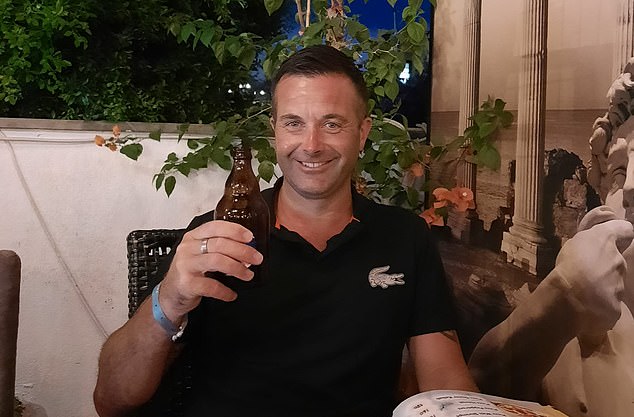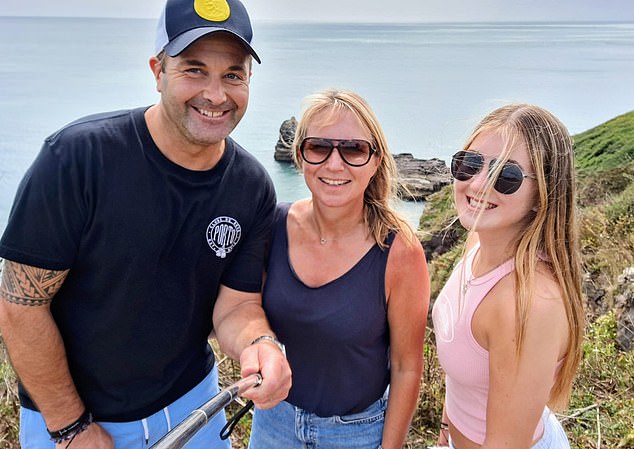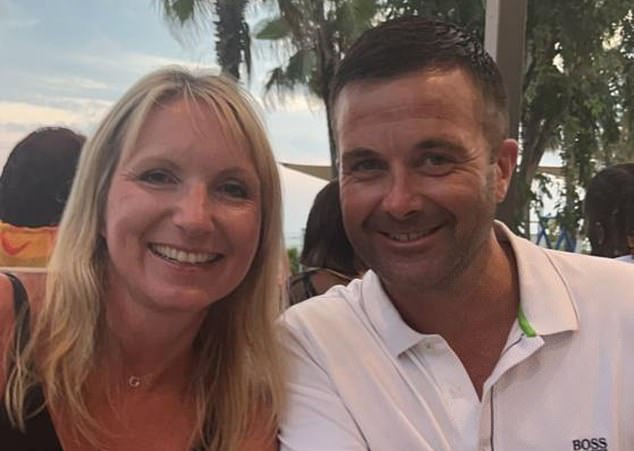A ‘fit and healthy’ father who was told a suspicious lump was simply an ‘ingrown hair’ has been left fighting for his life after it turned out to be a deadly cancer.
And in further devastating blow a catalogue of missed chances and NHS delays means his cancer may have been caught earlier at a far more treatable stage.
Kevin Hyde, 49, and from Milton Keynes, first went to his GP in October 2018 after noticing a small lump on his perineum—the part of the body between the genitals and the anus.
While on the surface a minor problem, the postman found the lump was causing him such intense pain that he struggled to sleep for a fortnight.
It also started affecting his job. Mr Hyde found he became unable to sit for long periods, and he struggled to get in and out of the van he used on his route, forcing him to take time off work.
While he did get an appointment with his GP the family doctor simply prescribed him antibiotics, telling him the lump was likely a simple infected hair follicle.
These drugs did help but, as Mr Hyde would learn later to devastating effect, this ingrown hair was in fact a rare cancer found in fewer than 20 patients per year.
It would be three years before the father-of-one and Liverpool football club fan learned truth about his condition.

A local postman, Kevin Hyde, was diagnosed with stage four incurable cancer after long delays
But following a series of delays to his treatment that spanned years, Mr Hyde has now been told the cancer has spread and is in its final, terminal stages.
He and his family are fundraising for private treatments including some overseas in a bid to give the beloved father and husband ‘more time’.
Speaking to MailOnline, his wife Nicola Hyde said she believes had her husband’s cancer been caught earlier, and had he not faced so many delays, he wouldn’t be facing such a grim prognosis.
‘When we found it had spread, we felt numb, shocked, and deeply angry that he’d been let down by the NHS,’ she said.
‘The delays in diagnosis and treatment have taken a serious toll on Kevin’s mental health. He became quiet, low in mood, and withdrawn, and wouldn’t return to the GP for help.
‘As a family, we’ve really struggled—dealing with anger, worry, and sadness.
‘Kevin is a Liverpool supporter and the motto “you’ll never walk alone” has been something that has been demonstrated in abundance and kept him going.’
While Mr Hyde originally sought help in 2018 it was only three years later in November 2021, when the lump became painful again, that he returned to his GP.

Mr Hyde stood next to his wife Nicola Hyde and their 16-year-old daughter Ellie
While once again prescribed antibiotics for his ‘ingrown hair’ this time the drugs didn’t seem to work, and he was referred for an urgent ultrasound at Milton Keynes University Hospital (MKUH).
However, due to delays, this didn’t take place until March 2022.
Following the scan, Mr Hyde was referred for further tests, but these were also subjected to more delays.
It wasn’t until July 27, 2023, that he underwent a PET scan—which uses small amounts of radiation to highlight unusual clusters of cells within the body—that the true cause of Mr Hyde’s symptoms became clear.
He was diagnosed with epithelioid sarcoma, a rare soft tissue cancer that develops in the body’s connective tissues, those that support the organs.
The most common symptom of this cancer is a lump like Mr Hyde’s found deep in the skin that is solid to touch, often painless, and hard to move around.
Other signs vary greatly depending on where exactly the cancer forms and can include stomach pain, constipation or a persistent cough.
At the time doctors at Churchill Hospital, in Oxford discovered the cancer, it had not spread to other parts of his body, meaning his prospects were good.
Mr Hyde began a five week course of radiotherapy on September 13, 2023 and was initially booked in for surgery to remove the tumour at the beginning of December.
But it was delayed due to a ‘combination of waiting on scans, a lack of beds and NHS strikes’ as well as needing ‘three different surgeons available at the same time’.
This meant he wasn’t able to get the surgery until January 10, 2024, almost six months after his original diagnosis.
However, at this point, what had started as a small lump had grown to become a 9cm mass, and due to its size and location surgeons removed the whole mass, but couldn’t achieve a clear boundary.
On April 29 2024 Mr Hyde was told the cancer had advanced to stage four, meaning the disease had spread to his spine, some muscles in his back, and leg.
This effectively meant the cancer was now terminal.
He was offered a series of treatments to slow the progression of the disease and give him more time to spend with his wife Nicola and their 16-year-old daughter Ellie.
However, Mr Hyde was subjected to even more delays for this treatment, and his radiotherapy did not begin until six months later in October 2024.

The delays to his treatment has continually been a source of stress for the whole family
Chemotherapy, aiming to also extend his life, was also subjected to cancellations and delays due to a lack of beds at Churchill Hospital, and this didn’t commence until December 2024.
Today the family are waiting on scan results—which Mrs Hyde has not been reported on over two weeks later—from Churchill Hospital—which will reveal his latest prognosis.
In a glimmer of hope, genetic testing has shown Kevin’s cancer has specific mutations that may respond well to targeted treatments and immunotherapy.
However these personalised treatments aren’t yet approved in the UK for treating sarcomas, meaning he will likely need to pay privately for the drugs or travel abroad to treat his cancer.
o pay privately for the drugs or travel
To help fund this the family has set up a GoFundMe which has so far attracted over £30,000.
Mrs Hyde said while this has given the family hope, the fact that her husband was still experiencing delays in his NHS treatment was an ongoing source of stress.
‘Right now, we’re doing our best to stay hopeful. But we’re facing continued frustration with long waits for scans, results, and treatment decisions,’ he said.
‘He finished chemotherapy on 12th April and hasn’t had any further treatment since, as we’re still waiting on MRI scan results. It feels like this delay is just giving the cancer time to progress.
‘The GoFundMe donations have thankfully allowed him to begin alternative treatments privately, which has been a lifeline.’
Throughout this journey, his wife sent formal complaints about the delays to her GP and relevant hospital trusts.
In their response, she claimed they put the delays down to Covid related backlogs, the rarity of the cancer, and limitations in diagnostic pathways.
On the difficult ordeal, she said: ‘I work in the NHS myself, so I understand the strain on the system.
‘I’m persistent and capable when it comes to navigating services and chasing departments—but even with that knowledge, it has been nearly impossible to cut through the systemic inertia.
‘I cannot imagine how much harder this would be for someone without the same understanding.’
Felicity Taylor-Drewe, Chief Operating Officer at Oxford University Hospitals NHS Foundation Trust, said: ‘Providing safe, timely and high quality patient care is our top priority.
‘So we are very sorry to hear about Mr Hyde’s concerns regarding his experience at our Trust. We take all complaints very seriously.
‘These are fully investigated, and we are committed to learning from all feedback we receive – positive and negative – to improve the care we provide.’
Meanwhile, a spokesperson for MKUH, said: ‘We offer our heartfelt apologies to Mr Hyde and his loved ones.
‘We are truly sorry for the delay in his treatment and the impact this has had on his health.
‘Mr Hyde deserves a high standard of timely care, and we deeply regret that we did not meet this expectation.
‘Our priority is to provide safe, timely and quality care to each and every patient.
‘We have thoroughly reviewed Mr Hyde’s case to identify lessons and remain committed to making all necessary improvements.’
Mr Hyde’s local GP surgery were also approached but they declined to comment on individual cases.












